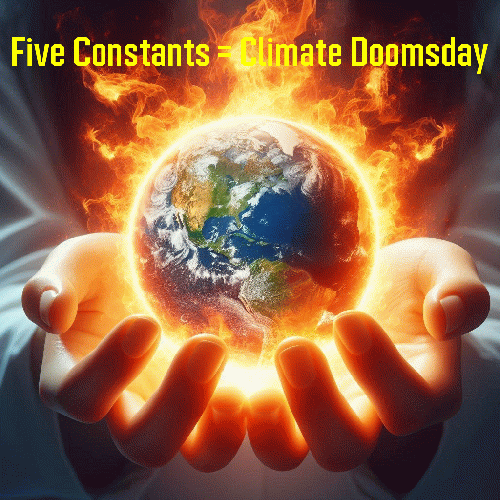From the outset, the major goal of the war on climate change has been to slow or stop the rise of carbon emissions in the atmosphere, thereby halting the planet's temperature from rising to dangerous, if not catastrophic, levels. This goal has inarguably failed despite massive activism, untold numbers of projects to defeat climate change, and huge worldwide financial investments in the war on climate change over the last two decades. Scientific data confirms this monumental failure. The planet is heating at an unprecedented rate. CO2 in the atmosphere has reached its highest level ever of 427 parts per million (ppm), far surpassing 350 ppm that scientists warned in 2008 should not be breached. Climate change disasters around the world increase every year. Yet the world fights climate change with the same failed strategies and investments. Five constants--meaning factors that are fixed and permanent--have paradoxically undermined efforts to battle climate change.
Constant 1
Nations are not likely to ever fulfill their commitments to achieve net zero emissions. They have not done it in the past because of energy crises, deniers within their countries, and vast numbers of companies and ordinary citizens who place immediate economic gains over the survival of life on this planet. These factors are not likely to change. While there is much dismay and criticism of the United States' withdrawal from the Paris Agreement to achieve net zero carbon emissions, all nations have, in effect, withdrawn. The only difference between the US withdrawal and the positions of the adopters of the agreement is that the US rejected the agreement based on the Trump administration's belief that climate change is a hoax. The other nations have unequivocally embraced the scientific doctrine that climate change is real and an existential threat to life on this planet. But they have failed to meet commitments and are now revving up their fossil fuel production, thus making the Paris Agreement a sham. Then supply chains of fossil fuels are likely to be disrupted by wars, other political conflicts, and economic issues. For example, the Russian invasion of Ukraine disrupted Russian oil supplies to European nations, which then increased their production of fossil fuels.
Constant 2
Regime changes like the recent one in the United States pivoted US policy from embracing the war on climate change to dismissing it with the commitment to "drill baby drill". Similar regime changes and geopolitical conflicts are likely in the future, which will work against defeating climate change.
Constant 3
The economies of many of the world's leading polluting nations are dependent on fossil fuel production and consumption. For example, oil and gas are 90% of Azerbaijan's exports. And the economies of Libya, Kuwait, Saudi Arabia, Iraq, Angola, and other countries are dependent on oil production. Russia has become more dependent on oil production as the rest of its economy has faltered. These nations will stall and undermine the switch to green energy. And with no current alternatives sufficient to replace fossil fuels it's no wonder that The Bulletin of the Atomic Scientists reported that the world's fossil fuel producers are "set to quadruple oil and gas production by 2030".
Constant 4
Nations with extensive rainforests--the lungs of the world--continue to waffle about opening these lands to oil drilling and deforestation. Some like the Congo have invited investments for drilling. Other underdeveloped countries are resisting demands that they practice severe conservation by restricting the production and use of fossil fuels and transitioning to green energies. They argue that superpower industrialized nations have hugely profited from recklessly exploiting fossil fuels and continue to do so. And the leading industrialized nations have been lax in meeting pledges to compensate poor nations for restraining the production and use of fossil fuels.
Constant 5
Corporations have an increasing carbon footprint as virtually every industry embraces AI technology, which consumes vast amounts of energy. Bloomberg Law News reports that "Tech companies' relentless push into artificial intelligence is coming at an undisclosed cost to the planet. Amazon, Microsoft, and Meta are concealing their actual carbon footprints." Many companies have pledged to reduce their emissions to net zero by 2040. But this may be too late if scientists are correct about a narrowing window before the world crosses critical points of no return. Unfortunately, as earth.org notes: "Only 4% of the world's largest 2,000 companies meet UN emissions reduction criteria despite a record number of net zero pledges." In a faceoff between the bottom line and carbon emissions, the buck always wins--a constant that does not bode well for the war on climate change.
Translating these five constants into a mathematical formula projects a grim result:
Constant 1+ Constant 2 + Constant 3 + Constant 4 + Constant 5 = Climate Doomsday
The expectation that nations and corporations will abandon their constants in the war on climate change defies the inherent meaning of the word constant. The formula of constants guarantees that the war on climate change will fail if left in the hands of nations, corporations, and the public. We need a bold new plan that creates and empowers an internationally independent entity, fully funded to develop nascent technologies such as nuclear fusion and carbon capture--technologies that hold the promise of achieving net zero emissions if developed to full commercial functionality. This strategy will transcend the restraints of the five constants. Yet no solution will save us unless we wake up to reality and stop wasting precious time trying the same failed strategies again and again and hoping for different results. Science has achieved the 'impossible' in the past and can do it again if given independence and the resources necessary for success.






